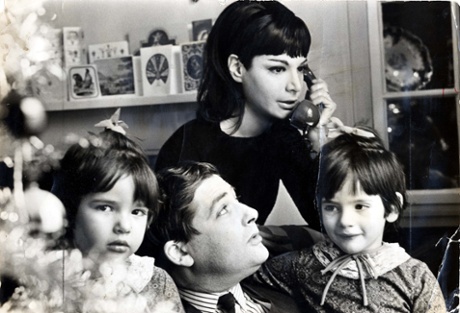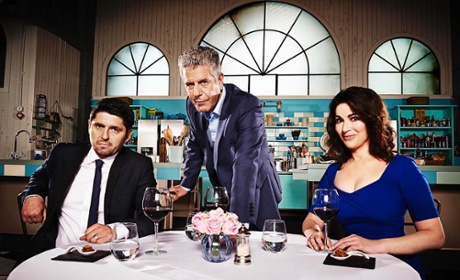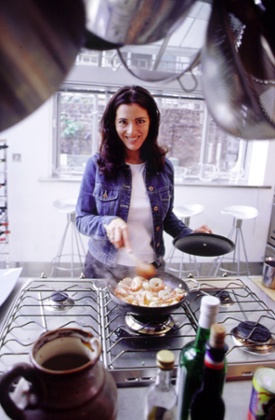Nigella Lawson: I'm very much a survivor. Everyone should be
The TV chef and Observer’s Food Personality of the Year on childhood, family and why she’d flunk the Great British Bake Off

You once said, “I feel that everything I want to say about life, I can say through food.” Could you elaborate on what you wanted to say – with both your food writing and TV shows?
Because I have a very personal way of writing, writing or talking about food is a way of keeping a diary. My first book, How to Eat, written when my children were babies, has a chapter on weaning, for example; Feastincludes a chapter on Teen Feasts.
Because I have a very personal way of writing, writing or talking about food is a way of keeping a diary. My first book, How to Eat, written when my children were babies, has a chapter on weaning, for example; Feastincludes a chapter on Teen Feasts.
I have always believed that what is true in the kitchen is also true out of the kitchen (and, indeed vice versa). In other words, cooking is a metaphor for life. When you cook, you need structure and an understanding and acceptance of the rules that actually matter, but just as importantly you need to be able to loosen up and go with the flow.
If you want to cook well, you must not strive for perfection but, rather, acknowledge your mistakes and work out how you can rectify them: it is in rectifying your mistakes that you actually go on to make something you’re happy with, that is really your own. I firmly believe that although the “point” of cooking lies in the end result, its meaning resides in the process.
So, in life, you have to concentrate in the present, rather than fretting about the past or worrying about the future. Easier said than done (believe me) but cooking helps you learn that.
I know this is not true for everyone, but I feel that cooking is a way of strengthening oneself: not being able to feed oneself to me feels like a state of victimhood; being able to sustain oneself is the skill of the survivor. And I am no victim, but very much a survivor! Everyone should be, or make sure they become one.
You’ve talked a lot about your food being “messy” – the word seem to have very positive connotations for you. Why is messy a good thing, in a food context? And in general?
Well, I promise you, my kitchen doesn’t look as if Lucille Ball’s been lurching from one comedy culinary catastrophe to another. I am messy, but not in the sense that I leave a trail of devastation behind me as I cook. No one can cook well – or rather comfortably – out of chaos. It affects the mind, one’s sense of wellbeing, and stops you from being able to react quickly in the kitchen.
Well, I promise you, my kitchen doesn’t look as if Lucille Ball’s been lurching from one comedy culinary catastrophe to another. I am messy, but not in the sense that I leave a trail of devastation behind me as I cook. No one can cook well – or rather comfortably – out of chaos. It affects the mind, one’s sense of wellbeing, and stops you from being able to react quickly in the kitchen.
But I’m certainly clumsy: I can’t chop neatly or with virtuoso rapidity; I spill things (though wipe them up); knock things over (but pick them up); and generally when I cook, every day, I don’t have a strategy or a recipe, I just grab what I want or simply happen to have in the house, tear herbs messily by hand, lose myself in the minute and anyone watching would think I have no idea of what I’m cooking. I do have an idea, it’s just an idea that can change as I taste, and any strategy or plan only cramps and confines me. I’m no good at authority, even my own.
As for how the food looks when I cook it, yes, it’s messy, but for me messiness is beautiful. I can’t stand a manicured plate, a thoughtfully placed arrangement, form over content, concept over taste. I want everything to tumble out in the bowl and just be resplendent and welcoming as it is. Perhaps messiness is not quite the right term for my approach: “haphazard” may sum it up more neatly.

What’s more important, and why – cooking a dish “correctly” or just making it delicious?
I’m not sure I’d be able to cook a dish “correctly”. Greed and impatience may not be considered virtues, but they certainly help me write a recipe and cook. Whenever I start cooking, or I read a recipe, my mind filters out complicated processes and what I think are unnecessary steps. Often this is simply to do with reducing the washing up. But I also want to get to the flavours faster. For me how food tastes is always the most important thing. How I get there, doesn’t worry me.
I’m not sure I’d be able to cook a dish “correctly”. Greed and impatience may not be considered virtues, but they certainly help me write a recipe and cook. Whenever I start cooking, or I read a recipe, my mind filters out complicated processes and what I think are unnecessary steps. Often this is simply to do with reducing the washing up. But I also want to get to the flavours faster. For me how food tastes is always the most important thing. How I get there, doesn’t worry me.
But we all have different temperaments and can be happy cooking only in ways that suit that temperament. People who, when they have a train to catch, need to be at the station more or less as the train is pulling out of the platform will have a quite different cooking style than those who feel happy only if they get there a good hour or two in advance.
You first started cooking for people in earnest in your second year at university. Tell us about those early dinner parties – what was on the menu?
Well, I didn’t have much money, so I used to go to the Covered Market in Oxford and buy huge sackfuls of onions. I was the uncrowned queen of onion soup.
Well, I didn’t have much money, so I used to go to the Covered Market in Oxford and buy huge sackfuls of onions. I was the uncrowned queen of onion soup.
I’d go into everyone’s room in my house-share and pick through whatever alcohol they had – miniature bottles of Bénédictine, cider, Bulgarian wine – and splosh that in as I cooked. And there was always stale bread and cheese past its best in our communal kitchen to make an oozy croute or two to go on top. I also used to buy extremely cheap cuts of meat. I could get a lamb breast for 25p (now you can’t even buy them as they’re all sold for kebabs) and would cook it low and slow with gorgeous whole spices in our bad-tempered oven.
Obviously, slow cooking is a wonderful thing for a student, as it more gratifyingly postpones the moment of essay writing. Or, once I’d started writing, the smells wafting through the house would ease the pressure of the stressay.

When you write, do you have a particular reader or readers in mind? How much is the writing a conversation with that person?
When I started writing about food, I certainly had my sister Thomasina (who died at 31 in 1993) in mind. I was continuing a conversation about food that we’d had daily when she was alive. But then, How To Eat had a more narrative way of giving recipes (I’ve never entirely lost that) as well as being a way of memorialising her and my mother’s food; she too had died young.
When I started writing about food, I certainly had my sister Thomasina (who died at 31 in 1993) in mind. I was continuing a conversation about food that we’d had daily when she was alive. But then, How To Eat had a more narrative way of giving recipes (I’ve never entirely lost that) as well as being a way of memorialising her and my mother’s food; she too had died young.
But I suppose I was also writing for myself, as cooking and enjoying food is a way of accepting and celebrating being alive, which can be hard when those you love have died. Call it survivor’s guilt, or simply an etiolated ability to take pleasure in life, a reduced sense of self, but whatever, cooking and writing about food restored me to life, and still does.
When I started on my second book, I had a certain friend in mind who’d been brought up by her mother to have a disdain for cooking, and I felt her confidence had been so diminished by that. She never felt at home in her own kitchen. So in my mind – not exactly consciously – was a desire to show her how easy cooking could be – and, frankly, it’s only as complicated as you want it to be – and what pleasure it could give. I suppose that motivation has been present in all my books. Another friend of mine said to me once after I’d given him one of my books: “You get me into the kitchen before I’ve had time to be frightened of being there.”
That’s what I want, and why my recipes – even for the simplest dishes – are often so long and chatty and adjectivally exuberant (sometimes to the point of no return).
How do those conversations differ when they take place through TV?
From my point of view, they don’t, but I never watch my programmes. Certainly, I feel that I have an intimate style of talking and have been made aware that can be construed as coquettishness. But believe me, I have nothing of the coquette about me.
From my point of view, they don’t, but I never watch my programmes. Certainly, I feel that I have an intimate style of talking and have been made aware that can be construed as coquettishness. But believe me, I have nothing of the coquette about me.
And when I’m told that I am full of innuendo, I am mystified. I am the least salacious person. I don’t know if that misconception is because women are still meant to be like Scarlett O’Hara, and pick like a bird, and that somehow seeing a woman enjoy food and having an appetite is regarded as wanton lasciviousness in itself. I’m not complaining. Food is sensual
But the conversation is still me, intimate and – like my cooking style – somewhat haphazard, as I am never scripted. And maybe I do sometimes go over the top: I have a nervous need to fill the silence (on screen and off) but I’m working on it!
What’s the very first thing you remember eating?
Oh, I was a terrible eater as a child. Hated it. Or, rather, hated mealtimes, so most of my memories are of being presented with a plate of cold, uneaten food from a previous meal (I was brought up old-school) and I wouldn’t describe that as eating, so much as suffering, food.
Oh, I was a terrible eater as a child. Hated it. Or, rather, hated mealtimes, so most of my memories are of being presented with a plate of cold, uneaten food from a previous meal (I was brought up old-school) and I wouldn’t describe that as eating, so much as suffering, food.
But I do remember being a very young child, with my grandmother in Brighton during a record-breaking heatwave of a summer, asking – when we dived into a cafe to take refuge from the sun – for buttered spinach and hot chocolate. What heaven that was! At the time, I didn’t understand why she felt it to be so amusing. Was rather affronted, actually.

What was the last thing you cooked for someone else, and why?
I’m filming in LA for a month and, inconceivable though this might seem, after a while, room service begins to pall, quite apart from being ruinously expensive. What’s more, I just don’t feel like me when I don’t cook.
I’m filming in LA for a month and, inconceivable though this might seem, after a while, room service begins to pall, quite apart from being ruinously expensive. What’s more, I just don’t feel like me when I don’t cook.
I have a kitchenette in my room (what pleasure it gives me just to say the word “kitchenette”) and I made me and a friend some roast sweet potatoes and tequila-and-lime-marinated chicken. I could have cooked it better with proper equipment and in my own oven, but I wasn’t after perfection but good, home food. And got it. But yes, the smoke alarm did go off.
What was the last thing you cooked that didn’t quite turn out as planned?
Actually, a lot of my favourite recipes have come about as a consequence of rectifying some mistake or other, so I’m not automatically dismayed at things going wrong. But I’ve been trying to make a form of grapefruit drizzle cake, and I just can’t get it right. When you make a lemon drizzle cake, it’s the zest that makes the cake lemony, the juice just provides that divinely squeaky sourness. But grapefruit zest is just disgusting, and doesn’t seem to have anything of grapefruit flavour, just its bitterness. I’ve tried it twice, without wholehearted success. I have a three-strikes-and-you’re-out rule, so if I don’t get it right next time, I’m kissing this particular idea goodbye.
Actually, a lot of my favourite recipes have come about as a consequence of rectifying some mistake or other, so I’m not automatically dismayed at things going wrong. But I’ve been trying to make a form of grapefruit drizzle cake, and I just can’t get it right. When you make a lemon drizzle cake, it’s the zest that makes the cake lemony, the juice just provides that divinely squeaky sourness. But grapefruit zest is just disgusting, and doesn’t seem to have anything of grapefruit flavour, just its bitterness. I’ve tried it twice, without wholehearted success. I have a three-strikes-and-you’re-out rule, so if I don’t get it right next time, I’m kissing this particular idea goodbye.
The Great British Bake Off – how far would you get?
I don’t even think I’d pass the audition stage. I love baking, and I bake a lot, and I love what I do bake, but just the words “uniformity of size and shape” make me quake.
I don’t even think I’d pass the audition stage. I love baking, and I bake a lot, and I love what I do bake, but just the words “uniformity of size and shape” make me quake.
I am not in the slightest bit insecure about what I can bake, and I’m so very happy doing it, but shop-bought perfection is way beyond me. But I’m perfectly content with that, and with the ramshackle homemade-ness of my creations.
Interview conducted via email between London and Los Angeles;@Nigella_Lawson
No comments:
Post a Comment